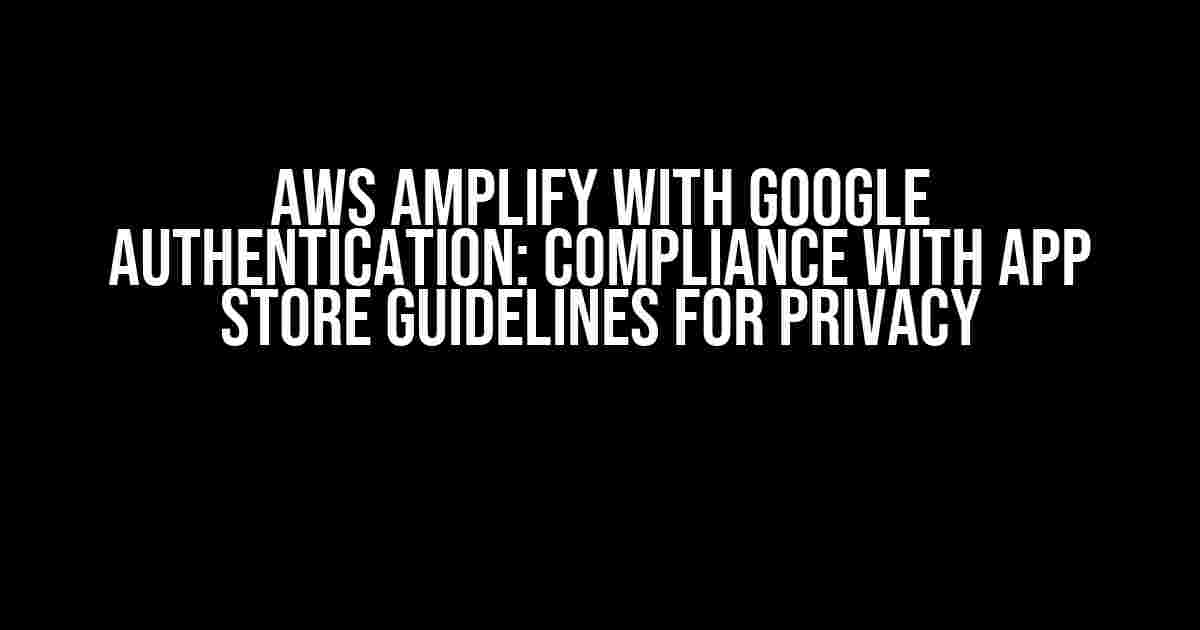As a developer, you’re well aware of the importance of providing a seamless user experience while ensuring the security and privacy of your app’s users. With the increasing concern for data protection, app stores have implemented strict guidelines to safeguard user data. In this article, we’ll explore how to use AWS Amplify with Google Authentication to comply with App Store guidelines for privacy, ensuring your app meets the necessary standards.
Understanding App Store Guidelines for Privacy
The App Store Review Guidelines emphasize the importance of user privacy and data security. Specifically, guideline 5.1.1 states that apps must:
- Protect user data and maintain the confidentiality of user information.
- Handle user data securely, including but not limited to encryption, secure storage, and secure transmission.
- Comply with applicable laws and regulations governing data protection and privacy.
Failing to comply with these guidelines can result in your app being rejected or removed from the App Store. In the following sections, we’ll delve into how AWS Amplify with Google Authentication can help you meet these requirements.
AWS Amplify: A Brief Overview
AWS Amplify is a development platform that helps you build, deploy, and manage scalable, secure, and engaging applications. With Amplify, you can leverage AWS services such as authentication, APIs, storage, and analytics to accelerate your app development. In the context of user authentication, Amplify provides a seamless way to integrate with various identity providers, including Google.
Google Authentication with AWS Amplify
Google Authentication is a popular identity provider that allows users to sign in to your app using their Google credentials. By integrating Google Authentication with AWS Amplify, you can provide a secure and convenient authentication experience for your users.
To get started, you’ll need to:
- Create an AWS Amplify project and set up an authentication configuration.
- Create a Google OAuth 2.0 client ID and secret.
- Configure the Google authentication provider in your Amplify project.
Step 1: Create an AWS Amplify Project and Set Up Authentication
$ amplify init $ amplify add auth
This will create an AWS Amplify project and set up an authentication configuration. You can then choose the authentication provider, in this case, Google.
Step 2: Create a Google OAuth 2.0 Client ID and Secret
In the Google Cloud Console, navigate to the OAuth 2.0 clients page and create a new client ID and secret. Note down the client ID and secret, as you’ll need them later.
Step 3: Configure the Google Authentication Provider in Your Amplify Project
$ amplify auth configure ? Select the authentication provider: Google ? Enter your Google OAuth 2.0 client ID: [YOUR_CLIENT_ID] ? Enter your Google OAuth 2.0 client secret: [YOUR_CLIENT_SECRET]
This will configure the Google authentication provider in your Amplify project.
Compliance with App Store Guidelines for Privacy
By using AWS Amplify with Google Authentication, you’re taking a significant step towards complying with App Store guidelines for privacy. Here’s how:
Data Encryption and Secure Storage
AWS Amplify provides secure storage and encryption for user data, ensuring that sensitive information is protected both in transit and at rest. With Google Authentication, user credentials are encrypted and securely stored, meeting the App Store’s requirements for handling user data securely.
User Consent and Data Protection
When users sign in to your app using Google Authentication, they’re aware of the data being shared and have control over their consent. This transparent and explicit consent process aligns with App Store guidelines, ensuring that users are informed and in control of their data.
Compliance with Applicable Laws and Regulations
By using AWS Amplify and Google Authentication, you’re leveraging established and reputable services that comply with applicable laws and regulations governing data protection and privacy, such as GDPR and CCPA.
Additional Best Practices for Compliance
In addition to using AWS Amplify with Google Authentication, consider the following best practices to further ensure compliance with App Store guidelines for privacy:
- Implement robust data encryption and secure storage for all sensitive user data.
- Provide clear and concise privacy policies that explain how user data is handled and protected.
- Obtain explicit user consent before collecting or sharing sensitive data.
- Regularly review and update your app’s security and privacy measures to ensure compliance with evolving regulations.
Conclusion
In conclusion, using AWS Amplify with Google Authentication is a powerful way to provide a secure and convenient authentication experience for your app users, while ensuring compliance with App Store guidelines for privacy. By following the steps outlined in this article and implementing additional best practices, you can confidently submit your app to the App Store, knowing that you’re protecting user data and meeting the necessary standards.
| App Store Guideline | AWS Amplify with Google Authentication |
|---|---|
| Protect user data and maintain confidentiality | Secure storage and encryption of user data |
| Handle user data securely | Encryption and secure transmission of user data |
| Comply with applicable laws and regulations | Leveraging established and reputable services that comply with laws and regulations |
By leveraging the power of AWS Amplify with Google Authentication, you can focus on building an exceptional user experience, while ensuring the security and privacy of your app’s users.
Here are 5 Questions and Answers about “AWS Amplify with Google Authentication: Compliance with App Store Guidelines for Privacy”:
Frequently Asked Question
Get answers to your burning questions about using AWS Amplify with Google Authentication while ensuring compliance with App Store guidelines for privacy.
Does using AWS Amplify with Google Authentication compromise user data privacy?
Not at all! AWS Amplify with Google Authentication is designed to ensure secure authentication and authorization while protecting user data privacy. Google’s authentication system handles the authentication process, and AWS Amplify securely stores and manages the authentication tokens, maintaining compliance with App Store guidelines for privacy.
How does AWS Amplify with Google Authentication handle user consent for data sharing?
AWS Amplify with Google Authentication provides a transparent and explicit consent flow, ensuring that users are informed and provided with the necessary controls to manage their data sharing preferences. This approach aligns with App Store guidelines, which require apps to obtain explicit user consent before collecting, using, or sharing their personal data.
Are there any specific App Store guidelines that AWS Amplify with Google Authentication helps me comply with?
Yes, AWS Amplify with Google Authentication helps you comply with several App Store guidelines, including those related to authentication, data storage, and data sharing. Specifically, it addresses guidelines around 4.8 (Sign in with Apple), 5.1.1 (Data Collection and Storage), and 5.3 (Data Sharing and Disclosure).
What kind of data is shared with Google during the authentication process?
When using AWS Amplify with Google Authentication, the only data shared with Google is the user’s authentication credentials, such as their Google ID and authentication token. No additional user data is shared unless explicitly authorized by the user, ensuring compliance with App Store guidelines for data sharing and user privacy.
How can I be sure that my app meets App Store guidelines for privacy when using AWS Amplify with Google Authentication?
AWS Amplify provides detailed documentation, code samples, and best practices to help you implement Google Authentication in a way that meets App Store guidelines for privacy. Additionally, you can consult the App Store Review Guidelines and Apple’s Human Interface Guidelines to ensure your app complies with all requirements.


